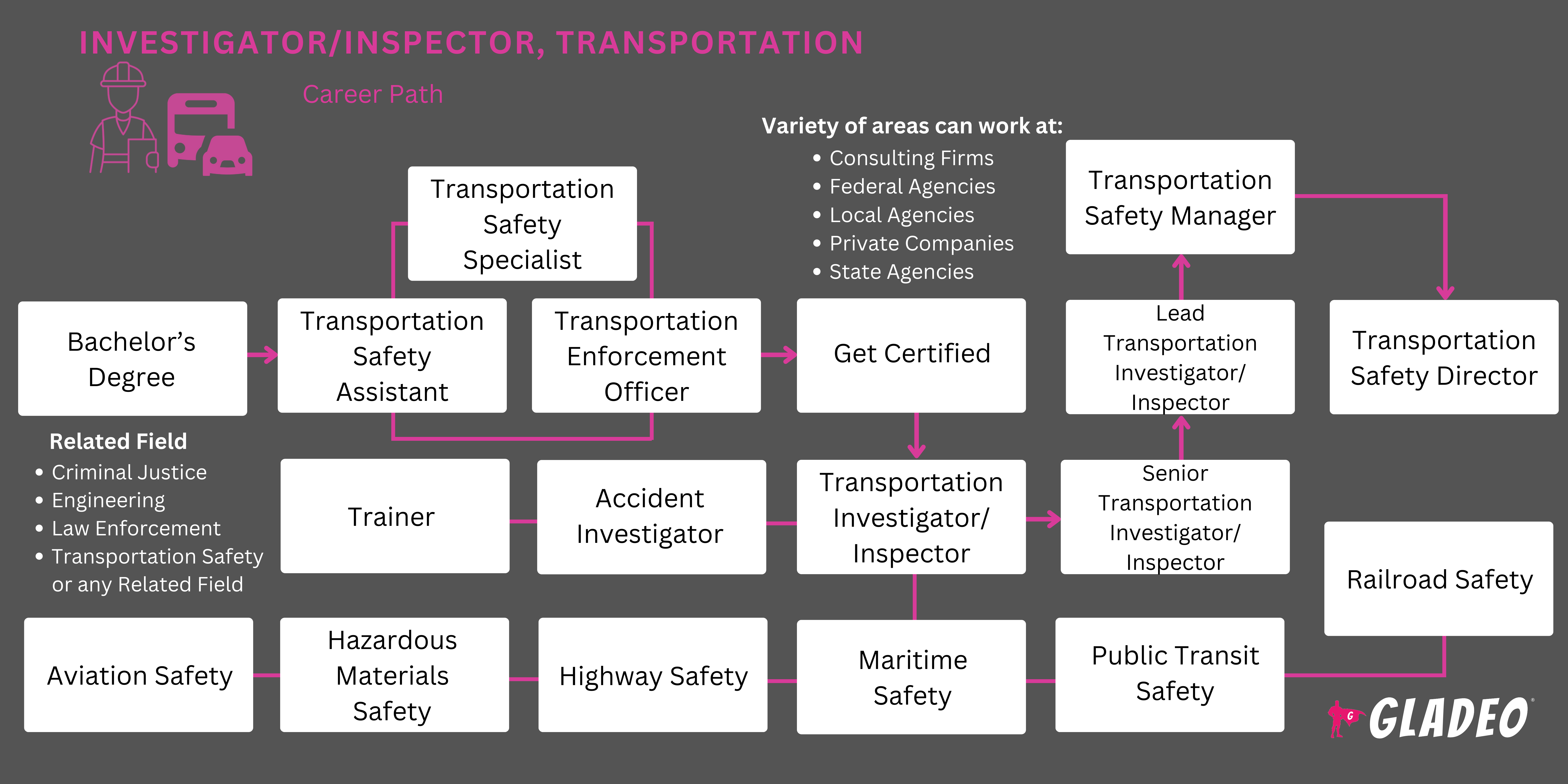聚光灯
类似标题
货物检验员、检查员、海洋货物检验员、海洋检验员、石油检查员、运输安全检查员、合规调查员(运输)、监管执法官(运输)、运输合规检查员、运输监管调查员、运输安全合规官、车辆检查员(运输)、商用车辆安全检查员
工作描述
每天,近 4000 万吨货物通过卡车、铁路和水路船只在美国境内运输。出于多种原因,运输检查员必须对这些货物进行定期检查,例如跟踪库存、确保正确装运产品、检查损坏情况、适用准确的税收和关税以及防止损失。
进行检查的目的还包括核实危险材料的安全运输程序,以及确保供应链免受走私和恐怖主义等非法活动的影响。
运输检查员通常受雇于政府机构,如运输部和州政府机构,但他们也可以为私营公司工作。他们与联邦航空管理局、运输安全管理局以及海关和边境保护局的检查员不同,尽管他们的职责相似。
职业生涯的回报
- 确保货物和乘客的安全运输
- 提高运输流程效率
- 遏制和揭露犯罪活动
- 在国家供应链中发挥不可或缺的作用
内幕消息
工作职责
工作日程
- 运输检查员通常全职工作,可能需要值夜班、周末班和节假日班。
典型职责
- 审查文件以确定货物运输能力
- 检查货物装卸设备和储存设施
- 监督将货物装入集装箱和车辆并进行支撑,以确保符合相关规定
- 检查装运货物,以核实安全可靠的阻塞和支撑以及易碎、危险和易腐货物的适当处理情况
- 通知工人任何特殊处理要求
- 在适用于易腐物品或其他温控物品的情况下,监控装运和储存区域的温度和湿度
- 用适当的危险材料警告标志标示车辆
- 测量载荷,确保其能够通过沿线的桥梁或隧道
- 测量船深并颁发合格证书
- 计算船舶稳定系数
- 在货物抵达或卸货时目视检查货物有无损坏
- 准备和提交检查报告
- 详细记录货运条件和观察到的问题
- 对检查中发现的任何违规行为提出纠正建议
额外责任
- 与团队成员有效沟通
- 了解行业法规和最佳实践的最新情况
- 确保用于检查的所有设备得到适当维护和校准
工作中需要的技能
软技能
- 分析性的
- 注重细节
- 沟通
- 协调
- 注重细节
- 勤奋
- 评价技能
- 独立性
- 诚信
- 人际交往技巧
- 观察者
- 组织能力
- 解决问题
- 现实的
- 时间管理
技术技能
- 能够检查车辆、货物、货物封堵和支撑、标签以及舱单文件
- 对车辆系统(如发动机、制动器、悬挂系统和电气组件)有基本了解
- 熟悉电子报告系统/车队管理系统
- 能够解决小问题,如发现漏水、螺栓松动或轮胎磨损等问题
- 熟练使用诊断工具(OBD-II 扫描仪、万用表和制动测试仪)
- 了解联邦汽车运输安全
管理局、运输部及其他机构的规定 - 了解货物装卸和运输技术(即正确固定、重量分配和危险品管理)
不同类型的组织
- 联邦和州政府机构
- 运输和仓储公司
- 铁路运输公司
- 船运公司
- 货运和物流公司
期望与牺牲
由于其工作性质,许多运输检查员都要暴露在各种户外条件下。因此,他们必须做好面对各种环境的准备,无论是酷暑、严寒,还是介于两者之间的任何环境。例如,如果他们在装货码头或港口工作,就必须小心冬季结冰的路面。
无论条件如何,检查员都不能走捷径。他们必须保持警惕,确保遵守安全法规和标准。唉,他们还必须面对那些可能会感到沮丧或想急于求成的货运工人。这就是为什么检查员必须能够坚守阵地,同时尽力保持礼貌和专业。
当前趋势
从事这一职业的人在年轻时喜欢做什么样的事情......
运输检查员可靠、独立。他们可能喜欢需要关注细节、解决问题和动手操作的活动。他们可能对事物如何在 "幕后 "运作感兴趣,这对从事与物流相关的职业非常有利!
需要的教育和培训
- 运输检查员需要高中文凭或同等学历,并接受过运输安全和法规方面的额外培训
- 社区学院和职业学校提供运输安全、物流及相关领域的课程和证书
- 相关课程主题可能包括
- 货物装卸和堆放
- 检查技术
- 物流和供应链管理
- 风险管理
- 撰写技术报告
- 运输安全法规
- 与物流、供应链、货运和运输相关的学徒制也是学习的好方法
- 查看 Apprenticeship.gov 的 "按职业搜索"功能,查找相关选项和机会!
- 大多数职位需要额外的在职培训。可能还需要特定州的执照和证书
- 认证有助于提高求职者的竞争力。热门认证包括
- 北美运输管理协会 -认证货物安全专业人员
- 公交安全和安保处 -公交安全和安保计划证书
在大学中需要注意的事项
高中和大学里的事情
- 高中数学和物理课很有用。如果学校开设了汽车技术课程,也可以考虑选修。
- 通过与供应链、物流、货物装卸和其他运输岗位相关的兼职工作或学徒培训获得实践经验
- 报读物流、供应链、货运或运输方面的证书或副学士学位课程
- 与该领域的在职专业人士建立联系。与他们讨论自己的职业道路
- 了解行业趋势,尤其是新技术
- 观看YouTube 视频和阅读有关运输检查的文章
调查员/检查员,交通路线图

如何找到你的第一份工作
- 要想找到一份检查员的工作,您可能需要先获得相关的工作经验,然后再逐步晋升。
- 查看 ZipRecruiter、SimplyHired、Indeed、Monster 和 Glassdoor 等网站上的招聘广告
- 查看初级职位。确保您符合教育和经验要求
- 查看简历模板。在简历中突出相关技能,使用招聘广告中的关键字,如
- 遵守法规
- 安全检查
- 车辆检查
- 危险材料处理
- DOT 法规
- 风险评估
- 事故调查
- 预防性维护
- 合规审计
- 检查报告
如何爬梯子
- 让你的上司知道,一旦时机成熟,你会对发展机会感兴趣。首先关注你受雇的工作,并分享你学习和进步的意愿
- 掌握自己的职责,然后继续学习!学习高级课程或完成专业认证,如注册货物安全专业人员或过境安全和安保计划证书
- 利用停机时间研究法规和学习新技术
- 正确地培训他人,因为如果他们犯错,就会反映到你给他们的培训上。
- 时刻强调安全和合规。成为正直的领导者,树立高标准!
- 赢得可靠和出色完成工作的声誉
- 加入美国运输与物流协会等专业组织
推荐的工具/资源
网站
- 美国国家公路和运输官员协会
- 美国公共运输协会
- 美国运输与物流协会
- 美国联邦汽车运输安全管理局
- 交通工程师学会
- 国际交通监管者协会
- 全国铁路安全顾问和调查员协会
- 全国各州学生交通服务主任协会
- 国家安全委员会
- 运输研究委员会
书籍
- 物流实用指南》:运输、仓储和配送入门》,Jerry Rudd 著
- 联邦汽车运输安全法规袖珍手册》,J.J. Keller 著
- 危险材料合规手册》,J.J. Keller 著
- 多式联运物流与运输:多式联运是绿色、高效和可持续供应链的未来,Arthur Wilson 著
B计划
运输检查员对于确保运输行业的安全和合规至关重要,但要想胜任这份工作可能需要一段时间。如果您对类似职业感兴趣,请考虑以下选择:
- 飞机货物装卸主管
- 机场业务专家
- 货物和货运代理
- 建设和建筑督察
- 建筑设备操作员
- 送货车司机
- 材料运输机械和车辆操作员的一线主管
- 重型和牵引车卡车司机
- 铁路工人
- 水运工人
新闻联播

特色工作

在线课程和工具







